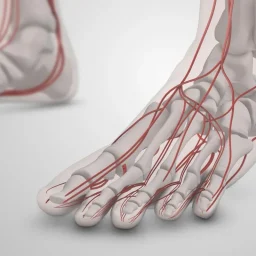
What Causes Diabetic Neuropathy?
Diabetic neuropathy is primarily attributed to prolonged and poorly managed diabetes. Elevated blood sugar levels over time can lead to nerve damage. The exact mechanisms behind diabetic neuropathy are multifaceted and include:
- Metabolic Changes: High glucose levels can alter various metabolic processes, affecting nerve function.
- Microvascular Damage: Diabetes can harm small blood vessels that supply nerves with essential nutrients and oxygen.
- Inflammation: Chronic inflammation is implicated in nerve damage and dysfunction.
- Autoimmune Response: The immune system may mistakenly target and damage nerve cells.
- Genetic Factors: Some individuals may have a genetic predisposition to neuropathy.
- Lifestyle Factors: Smoking, alcohol consumption, and obesity can exacerbate neuropathy.
- Duration of Diabetes: The longer a person has diabetes, the higher the risk of developing neuropathy.
How is Diabetic Neuropathy Diagnosed?
A doctor can usually diagnose diabetic neuropathy by performing a physical exam. Your doctor will check your tendon reflexes, overall muscle power/strength and sensation to touch. Along with the physical exam, your doctor may perform or order specific tests to help diagnose diabetic neuropathy, such as:
- Filament test is performed with a soft nylon fiber (monofilament) over areas of your skin to test your sensitivity to touch.
- Sensory testing is a non invasive test
- Nerve conduction study will quantitatively analyze the nerves in the lower extremity and is commonly used in the diagnosis
- EMG called electromyography and is usually performed in conjunction with nerve conduction study
What are the Complications Related to Diabetic Neuropathy?
Diabetic neuropathy, a common complication of diabetes, can lead to a range of potentially severe complications. These include:
- Foot Ulcers and Infections: Nerve damage can result in reduced sensation in the feet, making individuals susceptible to unnoticed injuries, ulcers, and infections.
- Amputation: In advanced cases, untreated foot ulcers and infections can necessitate amputation.
- Pain and Discomfort: Neuropathic pain, characterized by burning, tingling, or stabbing sensations, can significantly impact quality of life.
- Gastroparesis: Nerve damage affecting the digestive system can lead to delayed stomach emptying, causing digestive issues and poor blood sugar control.
- Cardiovascular Issues: Autonomic neuropathy can disrupt heart rate and blood pressure regulation, increasing the risk of heart-related complications.
- Sexual Dysfunction: Neuropathy may contribute to sexual dysfunction, affecting both men and women.
- Bladder Problems: Nerve damage can lead to bladder dysfunction, causing urinary incontinence or retention.
Managing blood sugar levels, regular check-ups, and lifestyle adjustments are crucial in preventing or mitigating these complications associated with diabetic neuropathy.
Prevention and Treatment of Diabetic Neuropathy
In the right patient our doctors can reverse the symptoms of peripheral neuropathy in many cases. The goals of treatment is to slow down the progression, alleviate any discomfort and restore function when possible. Read about routine diabetic foot care. The goals of treatment is to slow down the progression, alleviate any discomfort and restore function when possible.
Slowing progression of the disease is achieved by consistently keeping your blood sugar within your target range to prevent or delay nerve damage. Good blood sugar management may even improve some of your current symptoms.
Relieving pain may be achieved with prescription medications that are available for diabetes-related nerve pain, but they don’t work for everyone, especially due to side effects. Pain-relieving prescription treatments may include anti-seizure and antidepressants
Nutritional Support with Neuremedy
NeuRemedy is specially formulated to meet the increased nutritional requirements that accompany aging of the nerves in the feet and legs. This nutritional balance helps prevent the numbness, burning, tingling and pain associated with neuropathy
NeuRemedy is a proprietary formulation created by a physician and dispensed by physicians to support the nerve cells in the feet and legs. NeuRemedy supports healthy nerve function in the feet and leg by nourishing the nerves. NueRemedy has been used around the globe for 50 years and now in the United States the last 10 years.
Consult your Doctors in case you have any Symptoms of Diabetic Neuropathy
At Certified Foot and Ankle Specialists we stress these tips that must be followed if diagnosed with diabetic neuropathy:
- Blood sugar must be well controlled
- Be aware of the signs and symptoms
- Perform daily foot self-checks
- Be proactive with foot care, NEVER go barefoot
- Promote no smoking due to increased risk factors.
- Non invasive vascular and nerve testing
- Nutritional support is mandatory, NeuRemedy
Talk to your Certified Foot Specialist today to find out more information on treatment and testing for diabetic neuropathy.
By Dr. Stephen Kushner, DPM







